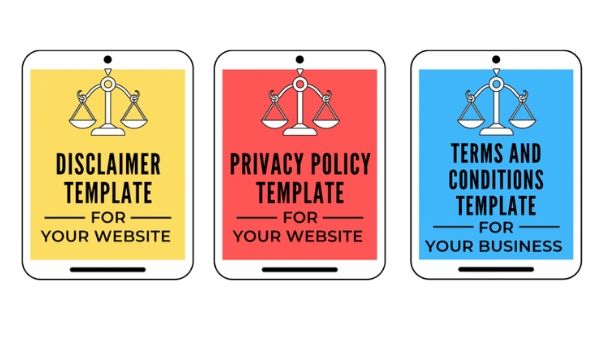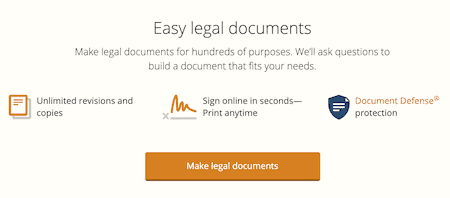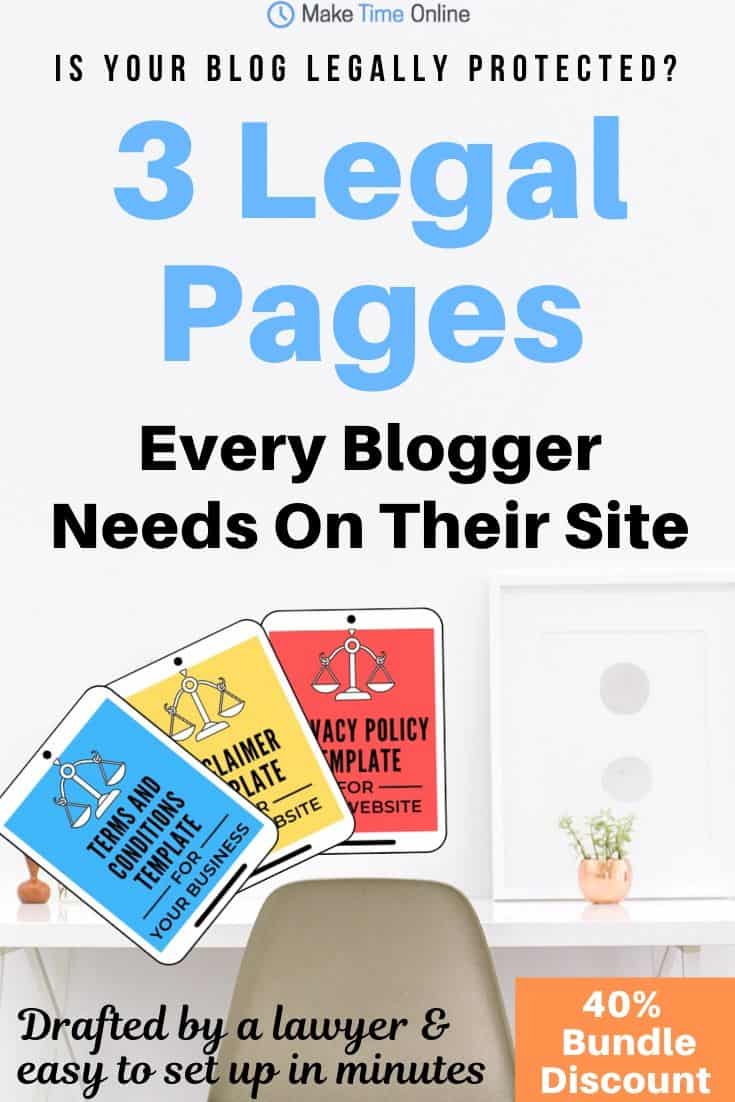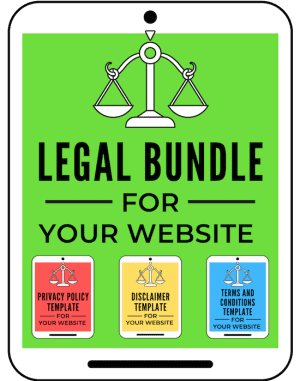In the spirit of full transparency, know that article on blogging legal pages contains affiliate links. This means if you make a purchase through these links, I may receive a small commission at no extra cost to you. Click here to read my full disclosure policy.

Do you ever feel like there just aren’t enough hours in the day to do everything you need to do?
Sometimes it can just feel like you’re chasing your tail to keep up with everything. And oftentimes protecting your blog moves to the back burner on the growing list of things to do.
But using blogging legal pages shouldn’t be one of these things.
If you ever get caught in legal trouble in the future these will be the most important pages on your blog. And here’s the truth:
You NEVER know when you may face legal issues.
It may never happen…
It could happen in a few years…
Or it could happen tomorrow (yes even if you don’t earn a penny from your blog!)
The good news is that by using templates these pages can actually be very simple to create.
In this podcast with Amira Law we chat about:
- How one piece of paper could have saved her Dad thousands of dollars
- The 3 most important blogging legal pages you need as a blogger
- The difference between writing these blogging legal pages yourself and having a lawyer do it
- Amira’s secret for becoming a master at anything she puts her mind to
Listen on Apple Podcasts/ Google Podcasts
Why do you need blogging legal pages?
If you’re like me this is probably the main question on your mind right now.
Why do something if it doesn’t need to be done, right?
There are many little reasons why you actually need blogging legal pages. But the main 3 that gave me a kick up the bum to sort this out were…
1. It’s the law!
So many beginner bloggers believe it is optional to have legal pages on their blog. Or if you have some generic policy you’d be fine.
I was one of them!
However, certain legal pages such as a Privacy Policy and disclaimer are actually a legal requirement in most states and countries.

There are different organisations around the world that are responsible for protecting the rights of consumers, such as the Federal Trade Commission (FTC) in the United States.
If you breach these consumer rights you could face a hefty lawsuit such as these previous ones.
If you are providing any advice or collecting any information (i.e. email addresses in the comment section at the bottom of each post) then you could be liable to these lawsuits.
Simple legal pages on your website can protect your blog legally!
2. Prevent people from stealing your hard work
You may be thinking…
Eh, I haven’t really got much stuff that people could steal yet, so this one doesn’t matter.
But the fact is, your hard work and efforts on your blog could be copied by someone else with no consequence. It can completely damage your website’s authority and credibility if someone else copies your work.

Having the appropriate legal pages on your website means you can take the appropriate action to remove copy-cats content.
This is called a Digital Millenium Copyright Act (DMCA) and you can go straight to their hosting provider to remove their content.
If you can show you have the correct legal page on your website to do this (the Terms and Conditions) it can be relatively painless and easy instead of needing to go through any court or use external legal help.
3. To shield yourself if you’re sued
This is another area that you may think…
Ah, I probably won’t get sued so I should be alright.
Amira actually explains the reason why she got into law. It was because this is exactly what happened to her Dad when he was only 1 year into his business.
It completely crippled the company and his ambitions.

All of this could have been prevented if he had one piece of paper laying out the expectations with the correct legal wording on it.
But that would have cost him around $150 and he didn’t see the point at the time!
The point is, you never know when someone is going to sue you.
And you may feel it’s completely unjust.
But luckily for you, you can put the correct measures in place before this happens to make sure you are not liable to unfair claims.
Is your blog legally protected?
In the podcast, Amira talks us through some of the common mistakes bloggers make when trying to make sure their blog os legally protected.
But she also explains how every blog needs to have 3 pages:
- Privacy policy (make sure you are GDPR compliant for any information collected on the website)
- Disclaimer (disclaim the information you provide is not “personal coaching/ advice for everyone. Also disclaim any affiliate marketing that you do)
- Terms and conditions (these are the rules for your website. How people should behave and act on the website etc.)

Getting these documents in place will help to make sure you are protected from most legal complications in the future.
Many bloggers don’t even know this.
And many bloggers try to do it themselves!
*Cough, cough… I was one of them*
Should you try to make blogging legal pages yourself?
If you want to have the peace of mind that your blog is protected…
No!
Seriously ask yourself if you will you know the technical jargon needed to make sure you are protecting yourself?
Amira even mentions a story about one of her clients in her day job as a lawyer…
Her client was being sued by one of their freelance workers. They had personally put together a contract with their freelancer at the start.
But because key terminology was missing from the document, there is nothing a lawyer or anyone could do to help.
By spending around $100 in advance on a piece of paper her client could have saved thousands of dollars and all of the time and hassle of the lawsuit.
Now, I can almost hear your mind wondering…
How to create legal pages for your blog
If you do not have any legal protection on your website then Amira recommends starting with the big three:
- Privacy policy
- Disclaimer
- Terms and conditions
Once you have these set-up, your blog will be legally protected for the most common legal issues bloggers run into (being sued or having someone else steal your work).
But how do you actually do this?
Option 1: Hire a lawyer
You can probably guess this is not the most cost-effective method.

The good news about this method is you know you would have exactly the right wording and documents to protect your blog moving forward.
But, you would have to pay their hourly rate and as Amira explains in the podcast, this could be around $350 an hour. You would likely end up spending $700+ per legal document the lawyer writes for you.
Positives:
- Completely specific for your website
- Provides peace of mind that your website is protected and legal
Negatives:
- Most expensive option
- Time-consuming to find and hire a good lawyer
Option 2: Free legal templates
Yes, you can find free legal templates online.

Here’s a couple of places you can try:
But here’s the truth… you have no idea if these templates apply to your blog and cover all the bases.
You will also need to spend a long time making them appropriate for your blog and checking them to see if they seem right.
But even then, you will likely be guessing (unless you are a lawyer!)
Amira has run a legal audit for a friend before who used these free templates. She found there were so many holes in them that leave them liable to legal action.
As Amira is a blogger and a lawyer, she understands the language that needs to be included in these legal documents.
Positives:
- It’s free!
Negatives:
- Time-consuming
- Never sure if you have everything covered or the correct terminology
Option 3: Paid legal templates
There is one simple reason that most bloggers use this option…
You get the benefit of professionally written documents by a lawyer for a fraction of the price of hiring them.
If you’re like me, you probably know that you could use a free template and adjust it to make it suit your blog.
But the truth is, you will have no idea whether you have covered all bases or even used the correct terminology to get you out of trouble. In the end, I accepted the law is just not an area to take a risk on!
Amira actually offers the 3 blogging legal templates in a bundle including:
- Terms and conditions template
- Disclaimer template
- Privacy policy template
I have personally used this bundle and I had it set up and published on my website with 20 minutes of work… most of that time was just reading the templates!
The best thing for me is that you can use these templates for any of your blogs.
So if you have multiple blogs these templates are pure gold! It saves so much time and covers all bases for blogs in different niches!
If you need anything additionally after, such as a freelancer contract or coaching agreement, then you can check out her legal store on her website.
Positives:
- Peace of mind you have the correct terminology to protect yourself
- Get this for a fraction of the price of hiring a lawyer
- Quick to add to your blog
Negatives:
- It’s not free
Get in contact with Amira
If you want to reach out to Amira to you can contact her in two main ways:
- Her website… A Self Guru
- Her blogging Facebook group (it’s amazing for bloggers as there’s so much opportunity to share content and connect with other bloggers)
Amira Law Podcast Transcript
Popular content:
- 25 Proven Ways to Make $1,000+ a Month Online
- Blog Income Reports Study- How the 7 Best Niches Make Money
- How to Use Pinterest for Bloggers: Ultimate Traffic Guide
Blogging legal pages summary
Now, I know it seems like there’s a lot of information in this podcast with Amira.
And there is no escaping the fact that it’s the law to have certain legal pages on your blog.
However, you don’t need to panic or get worked up if you haven’t set things up correctly so far. There are just 3 legal pages you need to protect your blog:
- Privacy policy
- Disclaimer
- Terms and conditions
These 3 documents come with a 40% discount if you purchase them in Amira’s legal bundle here.
It honestly takes 20 minutes to update the templates to suit your blog and then you never need to think about it again! Plus if you have any other blog or want to create one in the future you can use these templates for them.
If you think you may know someone else who would benefit from this, be sure to pin this page to share the information!






Hi Amira, thanks for the great advice about the importance of legal pages on a blog. I’m a fairly new blogger so this information will certainly come in handy. Thank you!
Hey Corinne, it is pretty eye-opening, isn’t it?! In my eyes, it’s simply not worth the risk of getting this wrong
Great podcast. Amira is great at what she does. No matter how small or big your business is, legal side of it has to be managed properly.
Very true Nadia! She is great and the legal side of any business should not be overlooked
I use these templates and I LOVE them. I am so thankful I found them.
Glad they helped! They are pretty amazing
hi, as much fun as it is, business involved learning about the law. In my opinion, it’s about as much fun as accounting is, and let’s just say I don’t like accounting very much. by the way, business involves learning about laws. So that’s why it’s so important to be doing your research and spending the time to learn.
Hey Jake, yeah I’m with you there. It’s one of those areas that are not always the most glamorous or fun, but it is so important to make sure it’s set up correctly from the start. After all, failing to prepare is preparing to fail!
Thank you for sharing these 3 legal pages. I have to say that at this age and time, one cannot be too careful. I am going to subscribe your podcast and listen to them 🙂 One thing that I leaned in life is that there are many people who are looking to sue you as the way that they make their living. I see that all the time in the hospitality industry, once it is a class action you are doomed.
I do have Disclaimers and Privacy Policy already but I will add Terms and conditions immediately. Thanks again!
Thanks so much for the kind words Nuttanee! Glad it could help
Thanks so much for this post… was wondering if I had properly protected myself and my blog when I discovered your page. Absolutely awesome post that covers so much important ground. I’m going to be checking out your podcast, bookmarking this page and most likely ordering your templates. Proper disclaimers are important now and will become even more important as the online world continues to grow. There’s something’s that are worth spending on and some that aren’t as important and long term in this litigious world covering yourself is critical. Thanks again!
Hey Judy, you’re so right! Unfortunately it’s something that we often overlook when starting a blog (myself included here) especially when it’s not generating an income.
The thing is we never know when legal issues will arise and but spending 30 minutes to get this set up right from day one means you don’t have to worry about these issues again.
I’m glad it helped